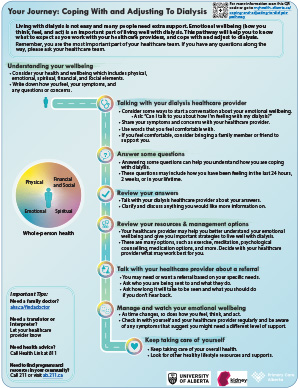Living with dialysis is not easy, and many people need extra support. Taking care of your emotional well-being (how you think, feel, and act) is an important part of living well with dialysis.
Mental health conditions, such as anxiety and depression, are common and affect people from all backgrounds. In Alberta:
- Nearly 1 in 3 Albertans receiving dialysis treatment experience symptoms that may look like depression.
- About 1 in 5 Albertans receiving dialysis treatment experience symptoms that may look like anxiety.
- Nearly 1 in 6 Albertans receiving dialysis treatment experience symptoms that may look like depression and anxiety.
Talking with your healthcare provider
To start a conversation about your emotional well-being with your healthcare provider, you can ask: “Can I talk to you about how I’m feeling with my dialysis?” Your healthcare provider might also start the conversation by asking: “Can I ask you about how you are adjusting to or coping with dialysis?”
Many words or feelings can describe how a person is feeling about their dialysis journey. Some healthcare providers may use words like mental health, depression, or anxiety. But some people may not feel comfortable using this language. Instead, you may prefer to use words like:
- “I feel like I’m not coping well.”
- “I’m feeling down.”
- “I’m feeling worried.”
- “I’m feeling on edge.”
It is important to use language you are comfortable with when talking to your healthcare providers.
After starting the conversation with your dialysis healthcare provider, they might ask you some questions. These questions can help your healthcare team better understand your emotional well-being, help diagnose certain conditions, and decide what specific supports you might need. One tool that your dialysis healthcare provider may use is the Edmonton Symptom Assessment System: Renal. You can do these questions alone or with the help of a family member, friend, caregiver, or healthcare provider. To prepare for these questions, reflect on how your dialysis journey has impacted your life, the things that are important to you, and your emotional well-being.
Based on your answers, your dialysis healthcare provider may ask you more questions. They may tell you that your answers showed a “minimal,” “mild,” “moderately severe,” or “severe” symptom of a specific health condition.

Your Journey: Coping With and Adjusting to Dialysis
Download or print the
full patient pathway (PDF) and
summary (one-page PDF) to learn more about what to expect as you work with your healthcare team and cope with and adjust to dialysis.
Patient Pathway  Summary
Summary 
